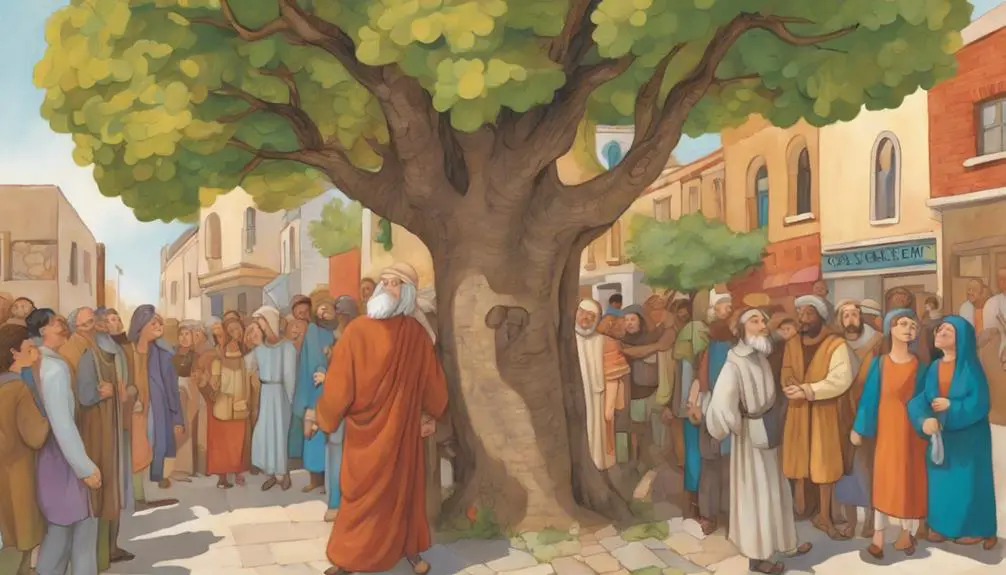Gain insight into the powerful stories of repentance in the Bible, exploring how they illuminate the path to forgiveness and personal transformation.

Repentance Story in the Bible
Imagine standing at a crossroads, the path behind littered with mistakes and the road ahead offering a chance for redemption. You're not alone in this journey; the Bible is filled with stories of individuals who've faced similar moments of decision.
From the humbling return of the Prodigal Son to King David's heartfelt plea for forgiveness, these narratives offer a deep dive into the complexities of human error and the transformative power of repentance. As you explore these tales, you'll find that each story not only reflects a moment of profound personal change but also serves as a mirror to our own lives, inviting you to reflect on the essence of redemption and how it shapes our understanding of forgiveness and growth.
Why do these stories of repentance continue to resonate so deeply, and what can they teach us about navigating our own moments of reckoning?
Key Takeaways
- Genuine repentance leads to profound personal and societal transformation.
- Repentance stories emphasize humility, remorse, and the willingness to change.
- Divine encounters often catalyze individuals' journey toward redemption and renewal.
- These narratives inspire hope and offer lessons on forgiveness and second chances.
The Prodigal Son Returns

In the parable of the Prodigal Son, a young man's return home symbolizes the transformative power of repentance and forgiveness within a biblical context. You'll find that this story intricately weaves family dynamics and cultural implications, offering a rich tapestry for analysis. The narrative not only addresses personal redemption but also delves into the complexities of familial relationships, highlighting the tension between justice and mercy.
The cultural implications are profound, reflecting a society where honor and shame are pivotal. The son's departure and subsequent return disrupt traditional values, challenging the community's perception of acceptance and reconciliation. You see, in this context, the father's unconditional acceptance of the repentant son serves as a counter-cultural act, undermining societal norms and expectations. It's a bold statement on the power of love and forgiveness over societal judgment and condemnation.
Moreover, the family dynamics at play reveal deeper insights into the nature of forgiveness. The father's immediate acceptance contrasts with the older brother's resentment, illustrating diverse responses to repentance within the family unit. This dichotomy sheds light on the complexities of forgiveness, suggesting that it's as much about the forgiver as the forgiven.
King David's Heartfelt Repentance

Shifting focus to another profound example of repentance, we examine King David's heartfelt plea for forgiveness following his grave misconduct, a narrative that further illuminates the complexities of guilt, redemption, and divine mercy within the biblical tradition. King David's story, particularly his transgression with Bathsheba and the subsequent fallout, is a pivotal moment that underscores the severe consequences of sin and the transformative power of genuine repentance.
- Bathsheba's Impact: The encounter with Bathsheba serves as the catalyst for David's moral downfall, highlighting how even the most devout can falter. Bathsheba's role isn't just as a figure in the narrative but as a symbol of David's vulnerability and failure, setting the stage for his redemption journey.
- Psalm of Confession: David's response to his sin, encapsulated in his Psalm of confession, offers an intimate glimpse into his soul's torment and his earnest yearning for divine forgiveness. This Psalm stands as a timeless testament to the depth of David's remorse and his unwavering faith in God's mercy.
- Acknowledgment of Sin: David's immediate acknowledgment of his wrongdoing, without excuses or justification, illustrates a profound understanding of repentance. It's not merely about seeking forgiveness but recognizing and owning one's faults.
- Divine Mercy: The narrative emphasizes that, despite the severity of his actions, David's genuine repentance opens the door to divine mercy, showcasing God's willingness to forgive those who truly seek to amend their ways.
Through King David's story, we're reminded of the enduring lessons of humility, the importance of a contrite heart, and the boundless grace of forgiveness.
Jonah's Reluctant Obedience

Exploring another dimension of biblical repentance, we now turn our focus to Jonah's story, where his initial reluctance to obey God's command reveals complex layers of human defiance and divine intervention. Unlike other narratives where protagonists immediately heed divine callings, Jonah's tale underscores a profound struggle between personal will and divine mandate. His attempt to flee not only illustrates the futility of resisting divine will but also sets the stage for a deeper exploration of repentance and obedience.
Jonah's journey is pivotal in understanding the dynamics of divine intervention. It's through God's persistent pursuit and a series of orchestrated events, including the infamous encounter with the great fish, that Jonah's heart begins to turn. This divine intervention serves as a catalyst for change, not just for Jonah but for the entire city of Nineveh. The magnitude of Nineveh's response to Jonah's prophetic warning showcases the transformative power of repentance. Their collective action, prompted by Jonah's reluctant obedience, highlights a critical aspect of the repentance story in the Bible: the potential for widespread redemption following individual transformation.
In analyzing Jonah's story, it's clear that divine intervention and human agency intertwine to unravel the complexities of repentance, obedience, and redemption.
Peter's Denial and Redemption

Peter's denial of Christ, thrice before the rooster crowed, unveils a profound narrative of human frailty and divine forgiveness within the biblical canon. This episode, deeply embedded in Christian theology, highlights the complexities of faith, betrayal, and redemption. Analyzing this event, you'll find:
- The Prelude to Denial: Before the fateful night, Christ predicts Peter's denial, a forewarning that underscores the inevitable human weakness even among the most faithful.
- The Act of Denial: Faced with fear and the threat of association with Christ, Peter succumbs to denying him thrice. This moment of weakness is a testament to the disciple's vulnerability.
- Cockcrow Realization: The crowing of the rooster acts as a jarring wake-up call for Peter, aligning precisely with Christ's prediction. This pivotal moment triggers an intense cockcrow realization within Peter, marking the beginning of his remorse.
- Disciple's Remorse: The depth of Peter's remorse is palpable; he weeps bitterly, embodying a genuine repentance spirit. This act of contrition serves as a critical turning point, paving the way for his eventual redemption and reinstatement as a pillar of the early Church.
Peter's journey from denial to redemption encapsulates a powerful message of hope and forgiveness, illustrating that despite profound failings, reconciliation and restoration remain within reach.
Zacchaeus' Transformation

Just as Peter's story illuminates the path from denial to redemption, the narrative of Zacchaeus exemplifies profound personal transformation through an encounter with the divine. Zacchaeus, a tax collector, lived a life marred by greed and societal ostracization. Yet, Zacchaeus' encounter with Jesus marks a pivotal moment of change. This interaction isn't merely a superficial meeting; it's a profound, transformative experience that challenges and redefines Zacchaeus' identity and purpose.
Analyzing Zacchaeus' transformation requires understanding the societal context. As a tax collector, he was despised, viewed as a traitor for aligning with Roman occupiers. Yet, his story boldly illustrates that redemption is accessible to all, regardless of past transgressions or societal standing. The societal response to Zacchaeus' encounter with Jesus is telling; it's a mix of skepticism and awe. This response underscores the radical nature of personal transformation in the biblical context—it's not just about the individual's change but also about challenging societal norms and perceptions.
Zacchaeus' story is a testament to the power of divine encounters to catalyze deep, lasting change. It emphasizes that transformation is possible, inviting individuals to seek and embrace redemption, regardless of their past.
Frequently Asked Questions
How Do Different Christian Denominations Interpret the Concept of Repentance in the Context of These Biblical Stories?
You'll find that denominational differences shape how Christians interpret repentance, without explicitly referring to biblical stories. These variances stem from interpretive methods, with some denominations emphasizing personal transformation and confession, while others focus on communal reconciliation and acts of penance.
Analyzing these perspectives offers a scholarly insight into the contextual understanding of repentance, illuminating how traditions and theological interpretations influence individual and collective approaches to this concept.
What Psychological Insights Can We Gain From the Repentance Stories in the Bible, and How Do They Relate to Modern Understanding of Guilt and Forgiveness?
You'll find that neuroscience perspectives shed light on how stories of transformation can offer insights into emotional healing. By examining these narratives, you understand how guilt and forgiveness interact within the human psyche.
It's fascinating to see how ancient tales align with modern psychological understandings, suggesting that the process of acknowledging wrongs and seeking forgiveness isn't only beneficial for emotional health but deeply rooted in our cognitive and emotional frameworks.
Are There Any Parallels Between the Repentance Stories in the Bible and Repentance Concepts in Other World Religions or Philosophies?
When you explore repentance across various world religions and philosophies, you'll find intriguing parallels. Interfaith dialogues reveal that many traditions emphasize remorse and making amends, resonating with philosophical ethics.
This common ground suggests a universal human inclination towards seeking forgiveness, understanding guilt, and pursuing moral rectification.
Such insights enrich our comprehension of repentance, bridging gaps between diverse beliefs and highlighting shared values in our quest for ethical living.
How Have Historical Events or Cultural Shifts Influenced the Interpretation and Teaching of These Repentance Stories Over Time?
You've likely observed how historical events and cultural shifts dramatically alter the interpretation and teaching of narratives.
Artistic interpretations and political uses especially highlight this evolution, revealing a complex interplay between prevailing ideologies and these stories.
These shifts aren't just academic; they reflect broader societal changes, impacting how communities understand and engage with these tales, thereby reshaping their meanings and applications in the contemporary world.
What Role Do Repentance Stories in the Bible Play in Contemporary Discussions on Justice, Redemption, and Rehabilitation in Society?
In contemporary debates on justice, redemption, and rehabilitation, stories of change and forgiveness play a pivotal role. They're not just tales; they influence legal reforms and fuel societal healing by offering frameworks for understanding personal transformation.
These narratives challenge and inspire legal systems and communities alike to reconsider approaches to justice. They underscore the power of second chances and the potential for individual and collective healing, making them essential in today's discussions.
Conclusion
In analyzing these narratives, it's evident that repentance, a cornerstone of biblical teaching, manifests through diverse experiences yet converges on a singular truth: transformation is attainable.
Each story, from the Prodigal Son to Zacchaeus, not only illustrates personal redemption but also reflects a broader theological motif of grace and forgiveness.
These accounts, rich in cultural and historical context, underscore repentance's pivotal role in spiritual renewal, emphasizing that sincere contrition is universally recognized and rewarded by the divine.



Sign up